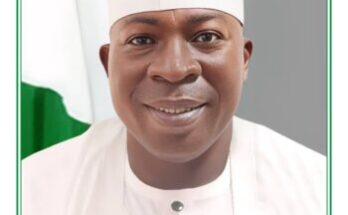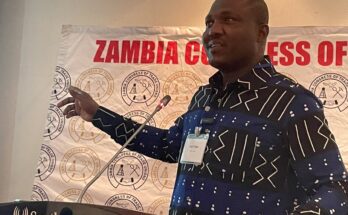Engr Abubakar D Aliyu, Yobe’s deputy governor, is the longest in that capacity, having spent 10 years. Recently, he spoke with some journalists on his experiences, oversight functions and politics, among others. MUSA M BUBA was there.
You have been in office as deputy governor for 10 years as the longest serving deputy governor in the country. What have been your experiences since then?
Thank you for reminding me that I am 10 years in office and the longest serving deputy governor in the country. Actually, l have been preoccupied and didn’t give any serious thought to the anniversary. Yes, our case was unique and peculiar because following the demise of my brother, the late Governor Mamman Ali, who spent just two years of his tenure in office, His Excellency, Ibrahim Gaidam became the governor and he nominated me as his deputy. We completed the remaining two years of the late Ali/ Gaidam tenure and thereafter, had two consecutive tenures of the Gaidam administration with me as the deputy. We give Allah the glory for giving us this opportunity to serve this long. I want to also appreciate the confidence and support of my boss, who single-handedly picked me to serve the state and be his deputy. To be frank with you, the duties of the deputy governor is easy yet, difficult. Easy in the sense that the deputy governor awaits orders from the governor. I enjoyed a lot of confidence and trust from my boss just as our relationship waxed stronger every day. Within these years, apart from my position as the deputy, I supervised commissioners in various ministries, was involved in many ad-hoc assignments and headed numerous major committees and served with every sense of commitment. I executed every responsibilities assigned to me with precision. As a deputy, l maintained good loyalty to the governor which added value and trust to our relationship.
Recently, you won the most loyal deputy governor award. What inspired you to attain that feat?
Naturally, I am a very loyal person. Not only to my boss but everyone that comes my way and interacts with me. To my boss, I am and would always be because he is my mentor. Another thing is that, one has to be patient, honest, truthful and avoid lying, breaking promises or hypocrisy. I always try my best not to be found in any of these. That was why I was considered loyal and my inspiration is from the teachings of Islam.
You chaired numerous committees including resettlement, reconstruction and rehabilitation of internally displaced persons. How would you describe your execution of this mandate?
As difficult as it was, I enjoyed doing this because it is a humanitarian service. It is a service that you put in your best to give dignity to life by improving the lives of displaced and vulnerable persons. The committee executed this assignment with a sense of responsibility and commitment. We strongly believed we were in the duty to serve both the displaced persons and God who will ultimately reward our efforts. In fact, the committee was guided by the fear of God. Again, it was a project that was very dear to my boss and obviously, wouldn’t want to fail him. It is a service to people who had suffered so much and are desperately looking for help and care. Just Imagine living in the comfort of your house and family, suddenly, you are thrown out into the bush. One must have the fear of God in tackling the situation and make life meaningful to them. So, with all sense of responsibility, we did everything humanly possible to address their situations. It may interest you to know that the displaced persons were adequately taken care of until they voluntarily returned to their communities and the IDP camps were formally closed.
How were you able to manage humanitarian agencies without any problem?
As a leader of the committee, I have various sectors in the committee and everyone had his own area of specialisation. I always anchor those ideas and tailor them towards success. We allowed our partners to do their works; we synergise to know what their commitments were and cooperate to do the job perfectly. Initially, they were sending their personnel to distribute the intervention materials to the IDPs but it reached a point that they entrusted the items for us to distribute. To institute transparency, we usually take the list and telephone
numbers of the beneficiaries to the donors for them to verify. I
believe dedication; honesty and teamwork helped us a lot in avoiding the pitfalls.
Recently, Yobe received national award and commendation from Bill and Melinda Gates foundation. How did you achieve this?
As chairman of the state committee on immunisation, l introduced high-level supervision. I am not a health worker but I make sure that I go to the most difficult and areas for personal supervision. I was at Tulu-Tuluwa, one of the border communities with very difficult terrain in the state. I compelled every member of the committee to be with us including the NGOs working in the state. There was a time they don’t follow us until they get clearance from their headquarters. I told them that if we are going out for the tour, they should either join us or cease to be members of the committee and they complied. It’s a very difficult task but with increased commitment, we achieved the set target and the ‘Save One
Million Life’ award has earned Yobe $29 million.
The State Boundary Commission is a constitutional responsibility of the deputy governor. What have you achieved in this area?
We achieved a lot; we were able to solve many boundary disputes among communities within the state and facilitated settlement of inter-state boundary disputes. In most of the areas we settled such disputes, we mounted the boundary lines. There are places that we had to resort to traditional approach for mutual settlement of some minor
disputes. In Yusufari/Nguru, we developed a home-grown approach with mutual understanding among the parties who also took oath with the Qur`an to ascertain that the dispute had been settled permanently. Another milestone achievement was the inter-state boundary disputes
between communities in Fika and Nafada in Gombe state.
This dispute had been there for several years but had been effectively addressed by the efforts of the two state governments and the National Boundary Commission.
Yobe South Senatorial zone is the political hot bed of the state. You are the political leader of the zone. How do you manage the political climate?
I am the political leader of our party in zone B. We are always guided by the policy thrust of the party and the directives from our leader. I have also been working hand in hand with all political stakeholders in the zone. Politically, zone B has always been highly competitive especially between the two political parties. Looking back into history, I think the only person elected and was able to serve two terms in the zone was late Senator Ali. But, the fortunes of APC in the zone had tremendously increased with lots of support in the last few years. I think, the diversity of ethnic and cultural groups in the zone was responsible for tensed political activity in the area. It is the only zone in the state that has more than five tribes and settler groups. Sometimes, managing such groups becomes a little bit complicated. We have tried so much within this period to build a bridge of trust and unity among the various groups. I have as a matter of deliberate policy to remain careful not to align with a single ethnic group; not even my own tribe because as a leader, you have to exhibit a sense of neutrality. Today, we are proud to have former senators, governorship aspirant and the lone serving PDP state House of Assembly member along with thousands of their supporters all defecting to APC.
You picked the senatorial ticket of your party in the last
primaries but asked to step down for Ibrahim Bomoi, you were later offered House of Representative ticket but you declined. What happened?
Well, that situation was very difficult for so many people to
understand. May be it`s because of the kind of person I am. I look at politics as a route to serve the people. That is why it should not a do-or-die affair because many people have the capacity to serve. Moreover, since I came into politics, I have never lobbied for any position including the office I occupy today. My boss invited me when l was acting permanent secretary and made me his deputy without lobby, so, when I was asked to step aside for the other candidate, I was given time to think and the governor waited for my consent; it was without any pressure. I only did that to ease the pressure on my boss and to provide a solution to the unease within the party especially the governorship and for the party to have a smooth sail during the primaries. As to why I didn’t pick the House ticket, already a candidate had emerged and l thought it was unnecessary to unseat him. I just offered myself to make the sacrifice for peace and tranquillity to reign in the party.
What are your plans after leaving office?
l am a trained and registered engineer. I intend to dust my jeans and go back to the field. Moreover, you don’t have to be in elected office to serve; there are a lot of areas you can be called upon to serve. We are always ready and prepared to serve our people, the state and the country diligently in any capacity.



